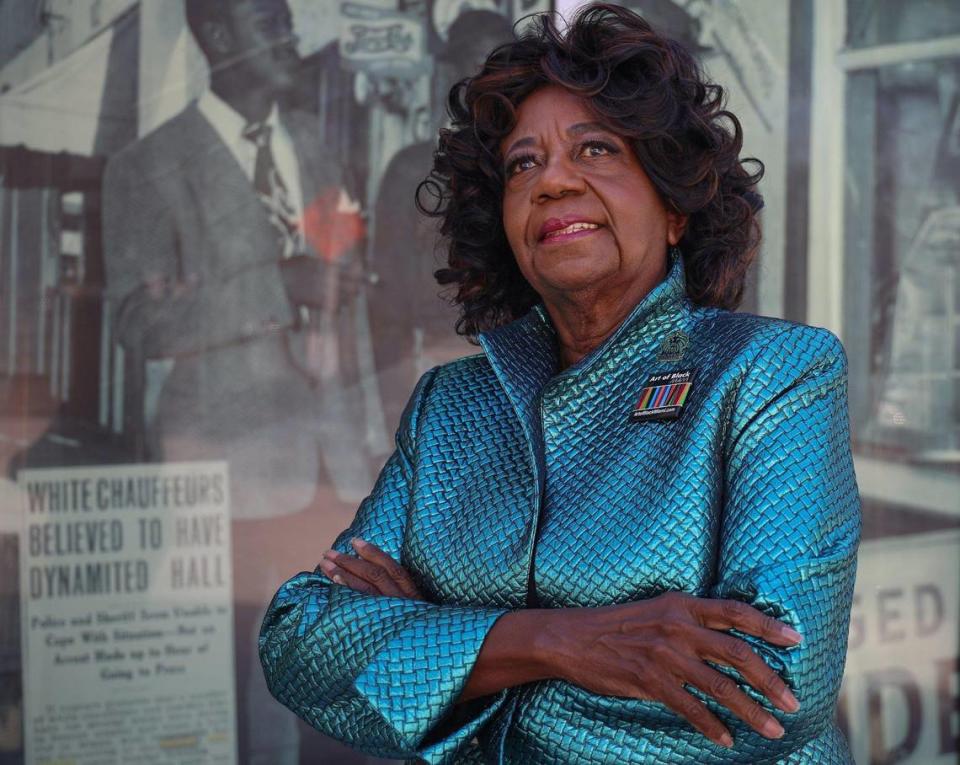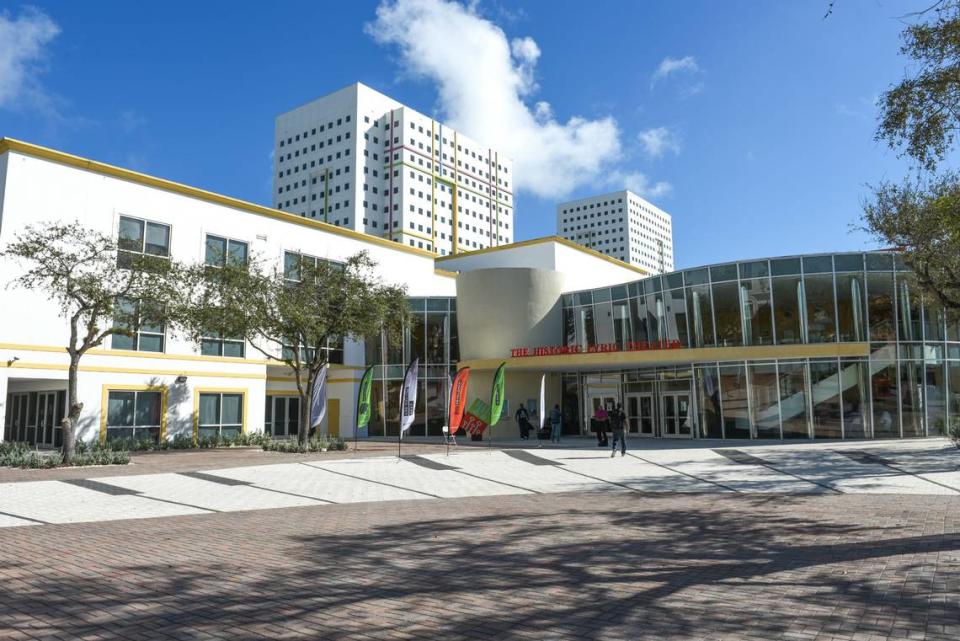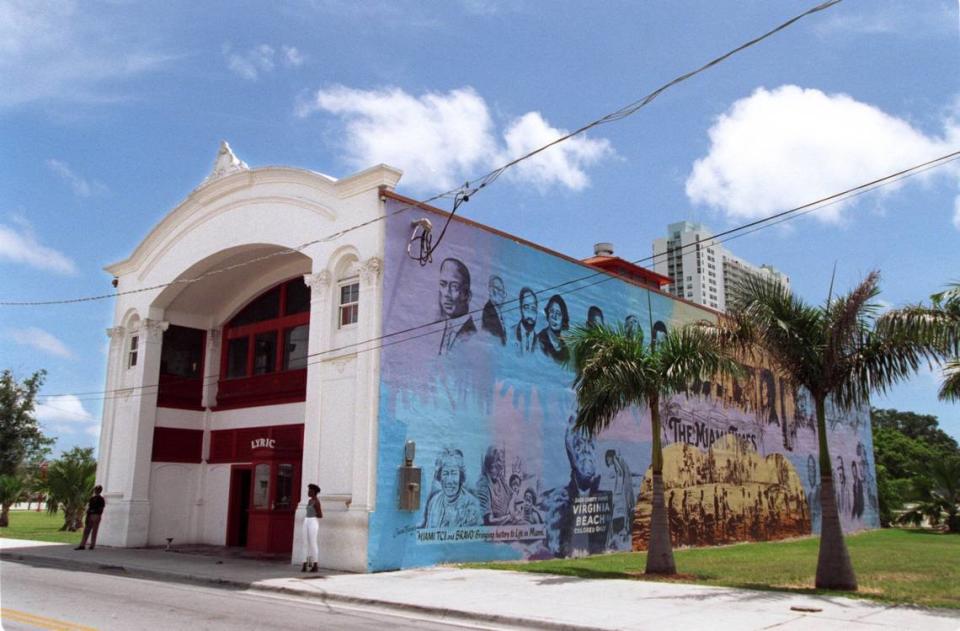This Miami theater was almost torn down, but now it’s celebrating 110 years in Overtown
The Lyric Theater was saved by God and Dorothy Fields.
At least that’s how Kamila Pritchett puts it.
“It was almost on the verge of demolition by neglect,” said Pritchett, the director of the Black Archives-Historic Lyric Theater. The nearby Miami Heat arena was being built and contractors planned to raze parts of Overtown for parking. A discovery, however, was made: the front facade of the building had faint etchings that read “General Assembly the Church Lord Jesus Christ of the Apostolic Faith.”
“That saved it a little bit of time being a religious building,” Pritchett continued, adding that the Lyric had a brief tenure as a place of worship that began in the late 1950s. “And in that time, Dr. Fields applied to have it placed in the national register of historic places and was successful.”

What Fields – and God, for what it’s worth – did was more than preserve a venue that once hosted Black luminaries including Langston Hughes, Ethel Waters and Mary McLeod Bethune. It was an act of protest in a city with little regard for Overtown’s history – or even the neighborhood itself. And as Miami’s oldest theater celebrates its 110th anniversary, community stakeholders intend for the Lyric to be a bastion of Black history amid the neighborhood’s gentrification and Florida’s restrictive education laws.
“Because Black Archives owns the Lyric Theater,” Pritchett said, referring to the organization Fields founded to preserve Miami’s Black history, “there will always be a presence of Colored Town no matter how many high rises come around.”
Built in 1913 by Georgia-native Geder Walker, the Lyric was one of the many entertainment centers that helped Overtown earn its “Harlem of the South” nickname. Although segregation ran rampant through Miami, places like the Lyric gave the community a sense of pride and status as everyone from hospitality workers to judges lived, worked and played in the neighborhood.
Walker “had gone to Europe and had seen the opera houses and opulent performance venues there and he knew that Overtown was a community that needed that same type of facility,” Pritchett said.
The 400-seat theater, however, wasn’t much of a concert venue. Some artists did perform – famed opera singer Marian Anderson, for example – but it mainly hosted speakers, community meetings, vaudeville shows and movies, according to Pritchett.
“It was not just entertainment for Black people,” Pritchett said. “It was entertainment in the Black community but you had white people and other people who were in Miami, wanted to have a good time and be in a community free from discrimination coming.”

In 1959, the Lyric would become an apostolic church and remained so until its abandonment in 1960s as a combination of many issues including desegregation and highway construction led to Overtown’s deterioration. Still, the very fact that the neighborhood, which was originally comprised of Black laborers whose working conditions on the railroads and hotels mirrored slavery, managed to grow into a thriving, self-sufficient community compelled Fields to save the Lyric Theater and start the Black Archives.
“I have not found any evidence of the expectation that Colored Town would be anything more than a weigh station for laborers,” Fields said in January 2023. “And by that I mean, there wasn’t any expectation of Black laborers and families build a community.”
Fields’ commitment to her community has been inspiring to transplants like Ingrid Bazin, better known as Ms. Ingrid B.
“As a Black person who is not native to Miami, I have a deep respect for the people who have fought for Overtown,” said Ms. Ingrid B, whose entertainment company On The B Side has curated live music and spoken word events at the Lyric and beyond since 2001. “Overtown is a whole revolution right now. I’m excited to be apart of the ultimate protest and that is the maintenance of Overtown.”
This is the type of programming Pritchett plans to bring to the theater to make it “come alive.” In the coming months, the venue will begin to host First Fridays at the Lyric, a concert series presented by the Sunshine Jazz Organization. Starting Jan. 10, 2024, it will host a weekend-long celebration of historically Black colleges and universities called HBCU Con. Throughout February, the theater will partner with the D.A. Dorsey House for tours of both historic landmarks.
“When people come to the Lyric Theater for a show, whether they are coming for a Black history program, whether they are coming for a concert, whatever they are coming for, that they are impressed by being in the space because it is a phenomenal space where they are encountering high quality programming and not because it’s ‘good for Overtown,’” Pritchett added. The added bonus will be “once you walk into that sacred space, you’re in Black history — whether you like it or not. You’re going to see an exhibit of whatever we have hanging on the walls that’s telling some story of our Black history.”

Pritchett also wants to add a genealogy lab so that locals can trace their ancestry as well as more storage space for their archives and rental space with a full service catering kitchen to host small conventions if need be. More than that, she wants to find a way to connect the Lyric with local youth in order to “cultivate the next generation of history keepers.”
“I think that protecting and safe-guarding history is what we’re doing. I’m not indoctrinating. I’m not editorializing. We have history. We present it to you,” Pritchett said. “If the history that’s presented to you makes you feel some kind of way then that’s even more of a reason why you should be taught it because hopefully you change your actions so that the parts of it that you’re embarrassed of don’t happen again.”

